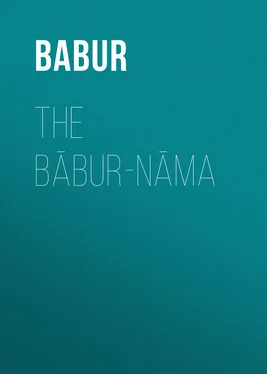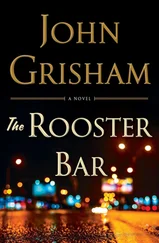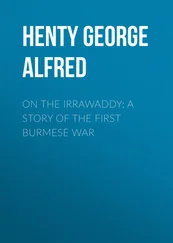Babur - The Bābur-nāma
Здесь есть возможность читать онлайн «Babur - The Bābur-nāma» — ознакомительный отрывок электронной книги совершенно бесплатно, а после прочтения отрывка купить полную версию. В некоторых случаях можно слушать аудио, скачать через торрент в формате fb2 и присутствует краткое содержание. Жанр: foreign_antique, foreign_prose, на английском языке. Описание произведения, (предисловие) а так же отзывы посетителей доступны на портале библиотеки ЛибКат.
- Название:The Bābur-nāma
- Автор:
- Жанр:
- Год:неизвестен
- ISBN:нет данных
- Рейтинг книги:4 / 5. Голосов: 1
-
Избранное:Добавить в избранное
- Отзывы:
-
Ваша оценка:
- 80
- 1
- 2
- 3
- 4
- 5
The Bābur-nāma: краткое содержание, описание и аннотация
Предлагаем к чтению аннотацию, описание, краткое содержание или предисловие (зависит от того, что написал сам автор книги «The Bābur-nāma»). Если вы не нашли необходимую информацию о книге — напишите в комментариях, мы постараемся отыскать её.
The Bābur-nāma — читать онлайн ознакомительный отрывок
Ниже представлен текст книги, разбитый по страницам. Система сохранения места последней прочитанной страницы, позволяет с удобством читать онлайн бесплатно книгу «The Bābur-nāma», без необходимости каждый раз заново искать на чём Вы остановились. Поставьте закладку, и сможете в любой момент перейти на страницу, на которой закончили чтение.
Интервал:
Закладка:
l. ‘Umar Shaikh Mīrzā’s Amīrs.
There was Khudāī-bīrdī Tūghchī Tīmūr-tāsh , a descendant of the brother of Āq-būghā Beg, the Governor of Hīrī (Herāt, for Tīmūr Beg.) When Sl. Abū-sa‘īd Mīrzā, after besieging Jūkī Mīrzā ( Shāhrukhī ) in Shāhrukhiya (868AH. -1464AD.) gave the Farghāna country to ‘Umar Shaikh Mīrzā, he put this Khudāī-bīrdī Beg at the head of the Mīrzā’s Gate. 153Khudāī-bīrdī was then 25 but youth notwithstanding, his rules and management were very good indeed. A few years later when Ibrāhīm Begchīk was plundering near Aūsh, he followed him up, fought him, was beaten and became a martyr. At the time, Sl. Aḥmad Mīrzā was in the summer pastures of Āq Qāchghāī, in Aūrā-tīpā, 18 yīghāch east of Samarkand, and Sl. Abū-sa‘īd Mīrzā was at Bābā Khākī, 12 yīghāch east of Hīrī. People sent the news post-haste to the Mīrzā(s), 154having humbly represented it through ‘Abdu’l-wahhāb Shaghāwal . In four days it was carried those 120 yīghāch of road. 155
Ḥāfiẓ Muḥammad Beg Dūldāī was another, Sl. Malik Kāshgharī’s son and a younger brother of Aḥmad Ḥājī Beg. After the death of Khudāī-bīrdī Beg, they sent him to control ‘Umar Shaikh Mīrzā’s Gate, but he did not get on well with the Andijān begs and therefore, when Sl. Abū-sa‘īd Mīrzā died, went to Samarkand and took service with Sl. Aḥmad Mīrzā. At the time of the disaster on the Chīr, he was in Aūrā-tīpā and made it over to ‘Umar Shaikh Mīrzā when the Mīrzā passed through on his way to Samarkand, himself taking service with him. The Mīrzā, for his part, gave him the Andijān Command. Later on he went to Sl. Maḥmūd Khān in Tāshkīnt and was there entrusted with the guardianship of Khān Mīrzā (Wais) and given Dīzak. He had started for Makka by way of Hind before I took Kābul (910AH. Oct. 1504AD.), but he went to God’s mercy on the road. He was a simple person, of few words and not clever.
Khwāja Ḥusain Beg was another, a good-natured and simple person. It is said that, after the fashion of those days, he used to improvise very well at drinking parties. 156
Shaikh Mazīd Beg was another, my first guardian, excellent in rule and method. He must have served ( khidmat qīlghān dūr ) under Bābur Mīrzā ( Shāhrukhī ). There was no greater beg in ‘Umar Shaikh Mīrzā’s presence. He was a vicious person and kept catamites.
‘Alī-mazīd Qūchīn was another; 157he rebelled twice, once at Akhsī, once at Tāshkīnt. He was disloyal, untrue to his salt, vicious and good-for-nothing.
Ḥasan (son of) Yaq‘ūb was another, a small-minded, good-tempered, smart and active man. This verse is his: —
“Return, O Huma, for without the parrot-down of thy lip,
The crow will assuredly soon carry off my bones.” 158
He was brave, a good archer, played polo ( chaughān ) well and leapt well at leap-frog. 159He had the control of my Gate after ‘Umar Shaikh Mīrzā’s accident. He had not much sense, was narrow-minded and somewhat of a strife-stirrer.
Qāsim Beg Qūchīn , of the ancient army-begs of Andijān, was another. He had the control of my Gate after Ḥasan Yaq‘ūb Beg. His life through, his authority and consequence waxed without decline. He was a brave man; once he gave some Aūzbegs a good beating when he overtook them raiding near Kāsān; his sword hewed away in ‘Umar Shaikh Mīrzā’s presence; and in the fight at the Broad Ford (Yāsī-kījīt circa 904AH. – July, 1499AD.) he hewed away with the rest. In the guerilla days he went to Khusrau Shāh (907AH.) at the time I was planning to go from the Macha hill-country 160to Sl. Maḥmūd Khān, but he came back to me in 910AH. (1504AD.) and I shewed him all my old favour and affection. When I attacked the Turkmān Hazāra raiders in Dara-i-khwush (911AH.) he made better advance, spite of his age, than the younger men; I gave him Bangash as a reward and later on, after returning to Kābul, made him Humāyūn’s guardian. He went to God’s mercy about the time Zamīn-dāwar was taken ( circa 928AH. -1522AD.). He was a pious, God-fearing Musalmān, an abstainer from doubtful aliments; excellent in judgment and counsel, very facetious and, though he could neither read nor write ( ummiy ), used to make entertaining jokes.
Bābā Beg’s Bābā Qulī (‘Alī) was another, a descendant of Shaikh ‘Alī Bahādur . 161They made him my guardian when Shaikh Mazīd Beg died. He went over to Sl. Aḥmad Mīrzā when the Mīrzā led his army against Andijān (899AH.), and gave him Aūrā-tīpā. After Sl. Maḥmūd Mīrzā’s death, he left Samarkand and was on his way to join me (900AH.) when Sl. ‘Alī Mīrzā, issuing out of Aūrā-tīpā, fought, defeated and slew him. His management and equipment were excellent and he took good care of his men. He prayed not; he kept no fasts; he was like a heathen and he was a tyrant.
‘Alī-dost T̤aghāī 162was another, one of the Sāghārīchī tumān -begs and a relation of my mother’s mother, Aīsān-daulat Begīm. I favoured him more than he had been favoured in ‘Umar Shaikh Mīrzā’s time. People said, “Work will come from his hand.” But in the many years he was in my presence, no work to speak of 163came to sight. He must have served Sl. Abū-sa‘īd Mīrzā. He claimed to have power to bring on rain with the jade-stone. He was the Falconer ( qūshchī ),worthless by nature and habit, a stingy, severe, strife-stirring person, false, self-pleasing, rough of tongue and cold-of-face.
Wais Lāgharī , 164one of the Samarkand Tūghchī people, was another. Latterly he was much in ‘Umar Shaikh Mīrzā’s confidence; in the guerilla times he was with me. Though somewhat factious, he was a man of good judgment and counsel.
Mīr Ghiyās̤ T̤aghāi was another, a younger brother of ‘Ali-dost T̤aghāī. No man amongst the leaders in Sl. Abū-sa‘īd Mīrzā’s Gate was more to the front than he; he had charge of the Mīrzā’s square seal 165and was much in his confidence latterly. He was a friend of Wais Lāgharī . When Kāsān had been given to Sl. Maḥmūd Khān (899AH. -1494AD. ), he was continuously in The Khān’s service and was in high favour. He was a laugher, a joker and fearless in vice.
‘Ali-darwesh Khurāsānī was another. He had served in the Khurāsān Cadet Corps, one of two special corps of serviceable young men formed by Sl. Abū-sa‘īd Mīrzā when he first began to arrange the government of Khurāsān and Samarkand, and, presumably, called by him the Khurāsān Corps and the Samarkand Corps. ‘Alī-darwesh was a brave man; he did well in my presence at the Gate of Bīshkārān. 166He wrote the naskh ta‘līq hand clearly. 167His was the flatterer’s tongue and in his character avarice was supreme.
Qaṃbar-‘alī Mughūl of the Equerries ( akhtachī ) was another. People called him The Skinner because his father, on first coming into the (Farghāna) country, worked as a skinner. Qaṃbar-‘alī had been Yūnas Khān’s water-bottle bearer, 168later on he became a beg. Till he was a made man, his conduct was excellent; once arrived, he was slack. He was full of talk and of foolish talk, – a great talker is sure to be a foolish one, – his capacity was limited and his brain muddy.
( l. Historical narrative. )
At the time of ‘Umar Shaikh Mīrzā’s accident, I was in the Four Gardens ( Chār-bāgh ) of Andijān. 169The news reached Andijān on Tuesday, Ramẓan 5 (June 9th); I mounted at once, with my followers and retainers, intending to go into the fort but, on our getting near the Mīrzā’s Gate, Shīrīm T̤aghāī 170took hold of my bridle and moved off towards the Praying Place. 171It had crossed his mind that if a great ruler like Sl. Aḥmad Mīrzā came in force, the Andijān begs would make over to him me and the country, 172but that if he took me to Aūzkīnt and the foothills thereabouts, I, at any rate, should not be made over and could go to one of my mother’s (half-) brothers, Sl. Maḥmūd Khān or Sl. Aḥmad Khān. 173When Khwāja Maulānā-i-qāẓī 174and the begs in the fort heard of (the intended departure), they sent after us Khwāja Muḥammad, the tailor, 175an old servant ( bāyrī ) of my father and the foster-father of one of his daughters. He dispelled our fears and, turning back from near the Praying Place, took me with him into the citadel ( ark ) where I dismounted. Khwāja Maulānā-i-qāẓī and the begs came to my presence there and after bringing their counsels to a head, 176busied themselves in making good the towers and ramparts of the fort. 177A few days later, Ḥasan, son of Yaq‘ūb, and Qāsim Qūchīn , arrived, together with other begs who had been sent to reconnoitre in Marghīnān and those parts. 178They also, after waiting on me, set themselves with one heart and mind and with zeal and energy, to hold the fort.
Читать дальшеИнтервал:
Закладка:
Похожие книги на «The Bābur-nāma»
Представляем Вашему вниманию похожие книги на «The Bābur-nāma» списком для выбора. Мы отобрали схожую по названию и смыслу литературу в надежде предоставить читателям больше вариантов отыскать новые, интересные, ещё непрочитанные произведения.
Обсуждение, отзывы о книге «The Bābur-nāma» и просто собственные мнения читателей. Оставьте ваши комментарии, напишите, что Вы думаете о произведении, его смысле или главных героях. Укажите что конкретно понравилось, а что нет, и почему Вы так считаете.











